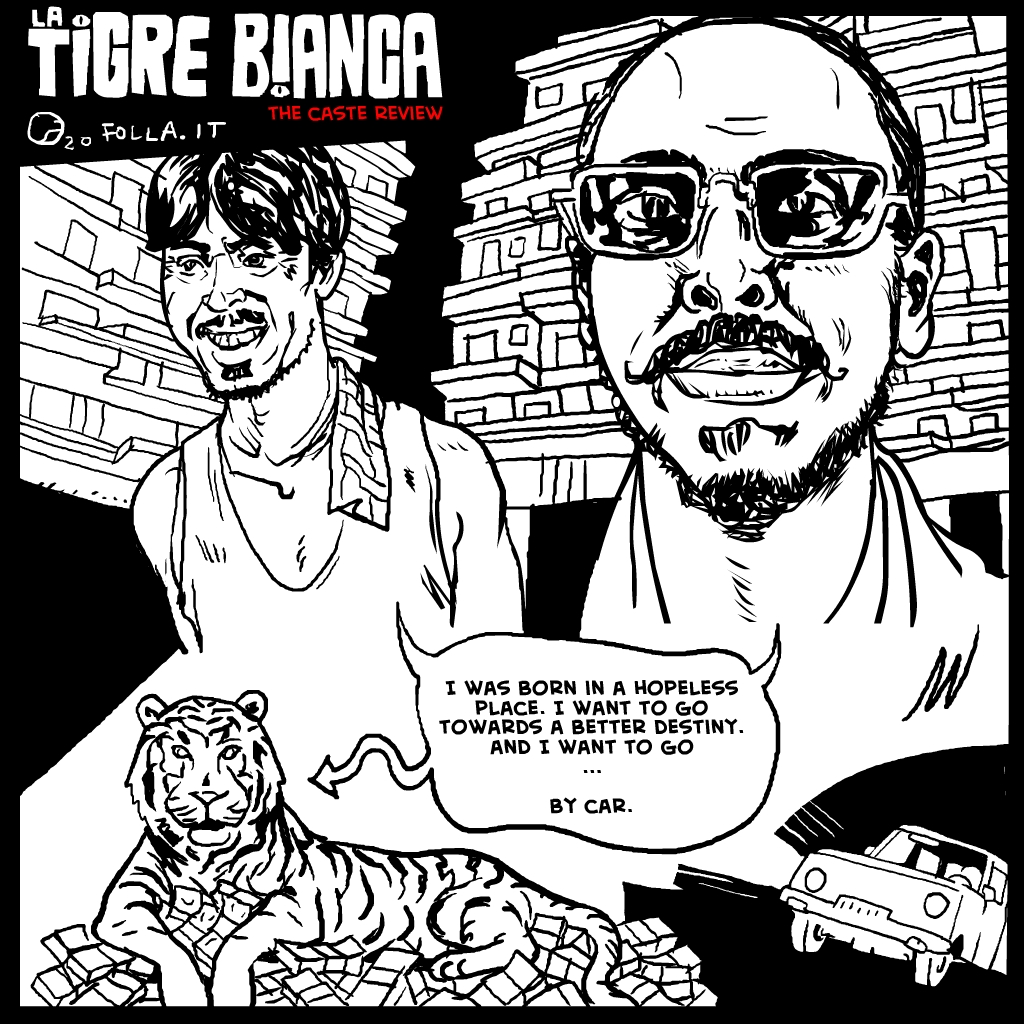
Per chi ha trovato stucchevole e fantasioso Slumdog Millionaire e ancor di più, Vita di Pi, ecco servito un tuffo nella realtà. Un ruvido risveglio. I temi rimangono gli stessi.
Il destino, l’eterna distanza che sempre separerà chi ha tutto e chi niente.
La colpa di nascere nel posto sbagliato.
Cosa c’è nella mente di una persona senza scelta? Cosa anima la sua sete di rivalsa?
Inevitabile il confronto con “The Millionaire” a cui si riferisce chiaramente. Quello più fiabesco nonostante la dura realtà descritta, questo più cinico e altalenante. Tra servilismo e rivalsa, tra disperazione e reazione. Una realtà che solo un occhio non cosciente potrebbe pensare esista solo in India.
Un esempio di rivoluzione che, archiviando quella collettiva, rimane personale.
Il protagonista, infatti, deve rassegnarsi a vivere da servo o scardinare alcuni tabù comportamentali. É una lotta tutta interiore.
Vengono messi al centro il concetto di libertà contrapposto a quello di famiglia e di destino.
La figura della donna non centrale ma determinante, sia nella figura della tradizionalista nonna, sia nella figura della moderna moglie del capo cresciuta a New York. Due visioni opposte della vita. La donna è simbolo di approccio alla vita. Quella innestata nella gerarchia delle caste o quella insofferente di fronte al maschilismo di una società bloccata? Quale delle due sceglierà il protagonista? Quella che persegue il modello ricevuto o quella che nel tentativo di emanciparsi rischia di tirar sotto qualcuno con la macchina?
La domanda che rimane sospesa è “chi è il protagonista?”. Una tigre bianca intrappolata in un pollaio o un servo che crede di affrancarsi dal proprio destino diventando un padrone?
Nel finale, poi, esplode un grosso sottotema del film, ovvero l’ascesa dell’India e della Cina nello scacchiere internazionale.
E poi c’è il bene ed il male. Il male che il protagonista fa per affrancarsi ed il bene che lui fa come padrone illuminato.
Intenso e a tratti spiazzante ma vivo di una necessità profonda.
Vedi anche
Trailer>>
________________________________________________________________________________________________
The white tiger, the caste review

For those who have found Slumdog Millionaire and even more so, Vita di Pi, cloying and imaginative, here is a dip in reality. A rough awakening. The themes remain the same.
Destiny, the eternal distance that will always separate those who have everything and those who have nothing.
The guilt of being born in the wrong place.
What’s on the mind of a person with no choice? What animates your thirst for revenge?
The comparison with “The Millionaire” to which it clearly refers is inevitable. The most fairytale one despite the harsh reality described, the most cynical and fluctuating one. Between servility and revenge, between despair and reaction. A reality that only an unconscious eye could think exist only in India.
An example of a revolution which, by archiving the collective one, remains personal.
The protagonist, in fact, must resign himself to living as a servant or unhinge some behavioural taboos. It is an entirely internal struggle.
The concept of freedom is placed at the center as opposed to that of family and destiny.
The figure of the woman is not central but decisive, both in the figure of the traditionalist grandmother and in the figure of the modern wife of the boss who grew up in New York. Two opposite views of life. The woman is a symbol of approach to life. The one grafted into the caste hierarchy or the one intolerant of the machismo of a blocked society? Which of the two will the protagonist choose? The one that pursues the model received or the one that in an attempt to emancipate itself risks pulling someone underneath with the car?
The question that remains open is “who is the protagonist?”. A white tiger trapped in a chicken coop or a servant who thinks he is freeing himself from his destiny by becoming a master?
In the finale, then, a major sub-theme of the film explodes, namely the rise of India and China in the international arena.
And then there is the good and the bad. The evil that the protagonist does to free himself and the good that he does as an enlightened master.
Intense and at times unsettling but alive with a profound need.
See also
Trailer>>








